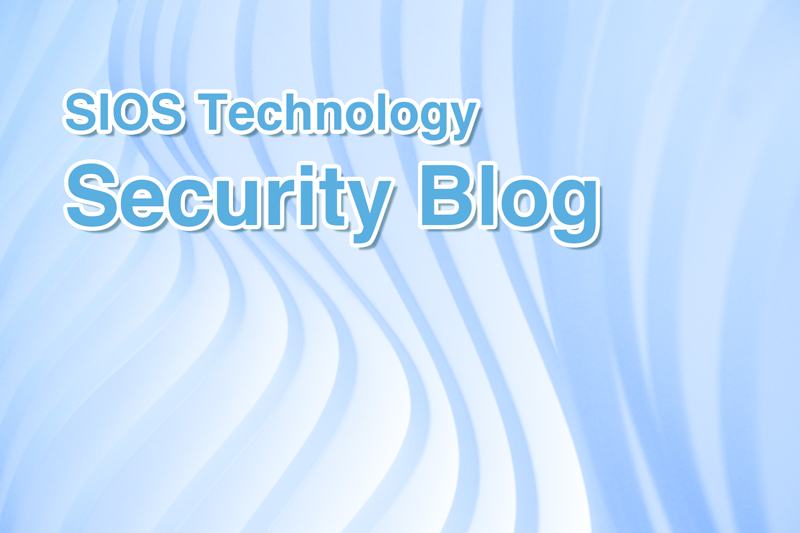こんにちは。SIOS OSSエバンジェリスト/セキュリティ担当の面 和毅です。
09/02/2022にLinux Kernelに複数の脆弱性(CVE-2022-1205 CVE-2022-1247 CVE-2022-1263 CVE-2022-1508 CVE-2022-1974 CVE-2022-1975 CVE-2022-1976 CVE-2022-2153 CVE-2022-2590 CVE-2022-3028 CVE-2022-1729 CVE-2022-2308 CVE-2022-2639 CVE-2022-2663 CVE-2022-3061 CVE-2022-3078 )が公開されました。今回はこれらの脆弱性の概要と、各ディストリビューションの対応について纏めます。
[過去の関連リンク]
Linux Kernelの脆弱性(Important: CVE-2022-0400)
Linux Kernelの脆弱性(Moderate: CVE-2022-2959)
Linux Kernelの脆弱性(Moderate: CVE-2022-2873)
Linux Kernelの脆弱性(Dirty Cred:CVE-2021-4154, CVE-2022-2588, and more in future)
Priority
| CVE番号 | 影響するバージョン | 一次情報源 | Priority | CVSS Score / CVSS Vector |
|---|---|---|---|---|
| CVE-2022-1205 | Red Hat: 5.1 Moderate | Red Hat: CVSS:3.1/AV:L/AC:H/PR:N/UI:N/S:U/C:N/I:N/A:H | ||
| CVE-2022-1247 | Red Hat: 7.1 Moderate | Red Hat: CVSS:3.1/AV:L/AC:L/PR:L/UI:N/S:U/C:H/I:H/A:H | ||
| CVE-2022-1263 | Red Hat: 5.5 Moderate | Red Hat: CVSS:3.1/AV:L/AC:L/PR:L/UI:N/S:U/C:N/I:N/A:H | ||
| CVE-2022-1508 | Red Hat: 6.8 Moderate | Red Hat: CVSS:3.1/AV:L/AC:L/PR:N/UI:N/S:U/C:H/I:N/A:L | ||
| CVE-2022-1974 | https://github.com/torvalds/linux/commit/da5c0f119203ad9728920456a0f52a6d850c01cd | Red Hat: 6.8 Moderate | Red Hat: CVSS:3.1/AV:A/AC:L/PR:H/UI:N/S:U/C:H/I:H/A:H | |
| CVE-2022-1975 | https://github.com/torvalds/linux/commit/4071bf121d59944d5cd2238de0642f3d7995a997 | Red Hat: 4.5 Moderate | Red Hat: CVSS:3.1/AV:A/AC:L/PR:H/UI:N/S:U/C:N/I:N/A:H | |
| CVE-2022-1976 | Red Hat: 7.8 Important | Red Hat: CVSS:3.1/AV:L/AC:L/PR:L/UI:N/S:U/C:H/I:H/A:H | ||
| CVE-2022-2153 | Red Hat: 5.5 Moderate | Red Hat: CVSS:3.1/AV:L/AC:L/PR:L/UI:N/S:U/C:N/I:N/A:H | ||
| CVE-2022-3028 | Red Hat: 6.7 Moderate | Red Hat: CVSS:3.1/AV:L/AC:L/PR:H/UI:N/S:U/C:H/I:H/A:H | ||
| CVE-2022-1729 | Red Hat: 7.4 Important | Red Hat: CVSS:3.1/AV:L/AC:H/PR:N/UI:N/S:U/C:H/I:H/A:H | ||
| CVE-2022-2308 | Red Hat: 6.3 Moderate | Red Hat: CVSS:3.1/AV:L/AC:L/PR:L/UI:N/S:C/C:L/I:L/A:L | ||
| CVE-2022-2639 | Red Hat: 7.0 Moderate | Red Hat: CVSS:3.1/AV:L/AC:H/PR:L/UI:N/S:U/C:H/I:H/A:H | ||
| CVE-2022-2663 | Red Hat: 5.9 Moderate | Red Hat: CVSS:3.1/AV:N/AC:H/PR:N/UI:N/S:U/C:N/I:H/A:N | ||
| CVE-2022-3061 | Red Hat: 6.2 Moderate | Red Hat: CVSS:3.1/AV:L/AC:L/PR:N/UI:N/S:U/C:N/I:N/A:H | ||
| CVE-2022-3078 | Red Hat: 5.5 Moderate | Red Hat: CVSS:3.1/AV:L/AC:L/PR:L/UI:N/S:U/C:N/I:N/A:H |
修正方法
各ディストリビューションの情報を確認してください。
CVE概要(詳細はCVEのサイトをご確認ください)
- https://cve.mitre.org/cgi-bin/cvename.cgi?name=CVE-2022-1205
- DoSの可能性
- Linux Kernelのアマチュアラジオ AX.25プロトコルでユーザー接続の機能の箇所にNULLポインタ被参照の問題が見つかりました。これを利用してローカルのユーザはシステムをクラッシュさせることができる可能性があります。
- https://cve.mitre.org/cgi-bin/cvename.cgi?name=CVE-2022-1247
- DoSの可能性
- Linux Kernelのrose_connect()で競合状態を引き起こす可能性がある問題が見つかりました。
- https://cve.mitre.org/cgi-bin/cvename.cgi?name=CVE-2022-1263
- DoSの可能性
- Linux KernelのKVMでvCPUをdirtyリングサポートが有効になっている際にリリースしようとするとNULLポインタ被参照が発生することがわかりました。この脆弱性によりホストOSのローカルの攻撃者は特別なioctl呼び出しを用いてkernel oopsを生じさせDoSを引き起こすことができる可能性があります。
- https://cve.mitre.org/cgi-bin/cvename.cgi?name=CVE-2022-1508
- 情報漏えいの可能性
- Linux Kernelのio_uringモジュールでユーザがio_read()を特別に細工されたパラメータで使用した場合に境界外読み込みの問題が発生することがわかりました。これを利用してローカルのユーザは境界外のメモリ内容を読むことができる可能性があります。
- https://cve.mitre.org/cgi-bin/cvename.cgi?name=CVE-2022-1974
- use-after-freeの脆弱性
- Linux KernelのNFCコア機能にkobjectの生成と削除で競合状態が発生する可能性が見つかりました。この脆弱性を利用してCAP_NET_ADMIN権限を持つローカルの攻撃者はカーネルの情報をリークすることができる可能性があります。
- https://cve.mitre.org/cgi-bin/cvename.cgi?name=CVE-2022-1975
- システムクラッシュまたは権限昇格の可能性
- Linux Kernelのnet/nfc/netlink.cにsleep-in-atomicバグが見つかりました。これによりローカルの攻撃者はユーザ空間でnfcデバイスをシミュレートすることでLinux Kernelをクラッシュさせることができる可能性があります。
- https://cve.mitre.org/cgi-bin/cvename.cgi?name=CVE-2022-1976
- 権限昇格の可能性
- Linux KernelのIO-URING実装に問題が見つかりましたローカルでリクエスト文字列を作成ための実行権限を持つ攻撃者はこれを利用してuse-after-freeを引き起こすことができる可能性がありますこれによりメモリの破壊や権限昇格に繋がる可能性があります。
- https://cve.mitre.org/cgi-bin/cvename.cgi?name=CVE-2022-2153
- システムクラッシュの可能性
- Linux KernelのKVMでSynIC IRQをセットしている際に問題が見つかりました。この問題によりSYNIC/STIMER MSRへ書き込むためのVMMの振る舞いをおかしくすることでNULLポインタ被参照を発生させることができる可能性があります。これによりローカルの非特権攻撃者は特別なioctlを呼び出すことでkernel oopsを発生させDoSを引き起こすことができる可能性があります
- https://cve.mitre.org/cgi-bin/cvename.cgi?name=CVE-2022-3028
- 境界外書き込みの可能性
- Linux KernelのIPフレームワークでパケット変換(XFRMサブシステム)に、xfrm_probe_algsが同時に発生して複数回の呼び出しが発生して競合状態が発生する可能性が見つかりました。これによりローカルの攻撃者は境界外書き込みやkernlヒープメモリのリークを行うことができる可能性があります。
- https://cve.mitre.org/cgi-bin/cvename.cgi?name=CVE-2022-1729
- 権限昇格の問題
- Linux Kernelのperf_event_open()で競合状態が発生しました。これによりローカルの非特権ユーザはroot権限を得ることができる可能性があります。
- https://cve.mitre.org/cgi-bin/cvename.cgi?name=CVE-2022-2308
- データ漏洩の問題
- Linux KernelでVDUSEバックエンドをvDPAとともに使用している場合に問題が見つかりました。現在はVDUSEカーネルドライバーにはデバイス構成スペースサイズがVDUSEユーザスペースによって渡されている機能と一致していることを確認するためのチェックがありません。これにより、virtioドライバーで未定義の動作やデータリークが発生する可能性があります。
- https://cve.mitre.org/cgi-bin/cvename.cgi?name=CVE-2022-2639
- 権限昇格の問題
- Linux Kernelのopenvswitchモジュールに整数変換によるエラーが見つかりました。充分に大きなアクションの数を与えられた際に、メモリを新たなフロー中の新たなアクションのためにコピーして確保する間に、reserve_sfa_size()関数が-EMSGSIZEで望む値を返してくれなくなり、境界外書き込みを引き起こす可能性があります。これによりローカルの攻撃者はシステムの権限を得ることができる可能性があります。
- https://cve.mitre.org/cgi-bin/cvename.cgi?name=CVE-2022-2663
- ファイアウォールバイパスの問題
- Linux Kernelのnf_conntrack_ircでメッセージハンドルが混乱されたり正しくないメッセージマッチが始まってしまうという問題が見つかりました。
- https://cve.mitre.org/cgi-bin/cvename.cgi?name=CVE-2022-3061
- 権限昇格の問題
- Linux Kernelのi740ドライバに問題が見つかりました。ユーザスペースのプログラムはioctl()インターフェイスを通じてそのドライバで任意の値を受け渡すことができる可能性があります。
- https://cve.mitre.org/cgi-bin/cvename.cgi?name=CVE-2022-3078
- NULLポインタ被参照の問題
- Linux Kernelに問題が見つかりました。vzalloc()を呼び出したあとでチェックが欠けていたのと、drivers/media/test-drivers/vidtv/vidtv_s302m.c中でメモリ割当後にfreeが欠けていたことがわかりました。
主なディストリビューションの対応方法
詳細は、各ディストリビューションの提供元にご確認ください
- Debian
- https://security-tracker.debian.org/tracker/CVE-2022-1205
- https://security-tracker.debian.org/tracker/CVE-2022-1247
- https://security-tracker.debian.org/tracker/CVE-2022-1263
- https://security-tracker.debian.org/tracker/CVE-2022-1508
- https://security-tracker.debian.org/tracker/CVE-2022-1974
- https://security-tracker.debian.org/tracker/CVE-2022-1975
- https://security-tracker.debian.org/tracker/CVE-2022-1976
- https://security-tracker.debian.org/tracker/CVE-2022-2153
- https://security-tracker.debian.org/tracker/CVE-2022-2590
- https://security-tracker.debian.org/tracker/CVE-2022-3028
- https://security-tracker.debian.org/tracker/CVE-2022-1729
- https://security-tracker.debian.org/tracker/CVE-2022-2308
- https://security-tracker.debian.org/tracker/CVE-2022-2639
- https://security-tracker.debian.org/tracker/CVE-2022-2663
- https://security-tracker.debian.org/tracker/CVE-2022-3061
- https://security-tracker.debian.org/tracker/CVE-2022-3078
- Red Hat Enterprise Linux/CentOS
- https://access.redhat.com/security/cve/CVE-2022-1205
- https://access.redhat.com/security/cve/CVE-2022-1247
- https://access.redhat.com/security/cve/CVE-2022-1263
- https://access.redhat.com/security/cve/CVE-2022-1508
- https://access.redhat.com/security/cve/CVE-2022-1974
- https://access.redhat.com/security/cve/CVE-2022-1975
- https://access.redhat.com/security/cve/CVE-2022-1976
- https://access.redhat.com/security/cve/CVE-2022-2153
- https://access.redhat.com/security/cve/CVE-2022-2590
- https://access.redhat.com/security/cve/CVE-2022-3028
- https://access.redhat.com/security/cve/CVE-2022-1729
- https://access.redhat.com/security/cve/CVE-2022-2308
- https://access.redhat.com/security/cve/CVE-2022-2639
- https://access.redhat.com/security/cve/CVE-2022-2663
- https://access.redhat.com/security/cve/CVE-2022-3061
- https://access.redhat.com/security/cve/CVE-2022-3078
- Ubuntu
- https://ubuntu.com/security/CVE-2022-1205
- https://ubuntu.com/security/CVE-2022-1247
- https://ubuntu.com/security/CVE-2022-1263
- https://ubuntu.com/security/CVE-2022-1508
- https://ubuntu.com/security/CVE-2022-1974
- https://ubuntu.com/security/CVE-2022-1975
- https://ubuntu.com/security/CVE-2022-1976
- https://ubuntu.com/security/CVE-2022-2153
- https://ubuntu.com/security/CVE-2022-2590
- https://ubuntu.com/security/CVE-2022-3028
- https://ubuntu.com/security/CVE-2022-1729
- https://ubuntu.com/security/CVE-2022-2308
- https://ubuntu.com/security/CVE-2022-2639
- https://ubuntu.com/security/CVE-2022-2663
- https://ubuntu.com/security/CVE-2022-3061
- https://ubuntu.com/security/CVE-2022-3078
- SUSE/openSUSE
- https://www.suse.com/security/cve/CVE-2022-1205.html
- https://www.suse.com/security/cve/CVE-2022-1247.html
- https://www.suse.com/security/cve/CVE-2022-1263.html
- https://www.suse.com/security/cve/CVE-2022-1508.html
- https://www.suse.com/security/cve/CVE-2022-1974.html
- https://www.suse.com/security/cve/CVE-2022-1975.html
- https://www.suse.com/security/cve/CVE-2022-1976.html
- https://www.suse.com/security/cve/CVE-2022-2153.html
- https://www.suse.com/security/cve/CVE-2022-2590.html
- https://www.suse.com/security/cve/CVE-2022-3028.html
- https://www.suse.com/security/cve/CVE-2022-1729.html
- https://www.suse.com/security/cve/CVE-2022-2308.html
- https://www.suse.com/security/cve/CVE-2022-2639.html
- https://www.suse.com/security/cve/CVE-2022-2663.html
- https://www.suse.com/security/cve/CVE-2022-3061.html
- https://www.suse.com/security/cve/CVE-2022-3078.html
対処方法
各ディストリビューションの案内に従い、アップデートを行ってください。全てのRed Hat製品でパッチが行き渡っているかを確認するには、Red Hat SatelliteやKatello、Spacewalk等を使うと管理が便利でしょう。
また、OSの再起動が発生しますので、pacemakerなどOSSのクラスタ製品やLifeKeeperなどの商用のクラスタリング製品を使うとサービス断の時間を最小限にすることが出来ます。
[参考]
日々のメモを更新しています。
セキュリティ関係ニュースを更新しています。個別で情報出せるようになる前の簡単な情報・リンクなんかも載せていきます。
CFP情報 1
CSS2022の論文投稿およびデモ展示・ポスター発表募集のご案内です。みなさまからのご投稿・ご発表をお待ちしております。
コンピュータセキュリティシンポジウム2022 (CSS2022)
■開催期間 2022年10月24日(月) ~ 2022年10月27日(木)
■会場 熊本城ホールとオンライン(ZOOM)のハイブリッド開催
■募集スケジュール
- 2022年08月12日(金) 論文発表申込締切(アブストラクト)
- 2022年08月23日(火) 17:00 デモ展示・ポスター発表申込締切
- 2022年08月23日(火) 17:00 最終原稿締切(カメラレディ)
主催 一般社団法人 情報処理学会 コンピュータセキュリティ研究会(CSEC)
共催 一般社団法人 情報処理学会 セキュリティ心理学とトラスト研究会(SPT)
合同開催
- マルウェア対策研究人材育成ワークショップ2022(MWS2022)
- プライバシーワークショップ2022(PWS2022)
- ユーザブルセキュリティワークショップ2022(UWS2022)
- OSSセキュリティ技術ワークショップ2022(OWS2022)
- ブロックチェーンセキュリティワークショップ2022(BWS2022)

